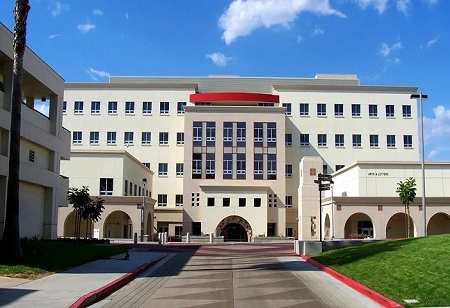As a faculty member for more than 40 years, Sandra Wawrytko has seen Asian Studies manifest a steadily increasing importance at San Diego State University. Now she’s committing herself to a personal role in ensuring the university’s resources keep up with the times. A planned gift of $1 million from the Charles Wei-hsun Fu Foundation, named for her husband who was born in Taiwan and died in 1997, will support an endowment for the Center for Asian and Pacific Studies (CAPS) providing additional money toward scholarships, events and programming, and operations. The Fu Foundation was created after Charles’ death and is now a tax-exempt family educational foundation. it’s a need driven both by cultural heritage and the global economy. Asian Pacific Islander Desi American (APIDA) enrollment comprises about 14% of SDSU’s undergraduate student body, its third largest ethnic group. And the university’s position on the Pacific Rim makes for a powerful connection to commerce and a wide range of other relationships with China, Japan, and the nations of Southeast Asia There are topics in Asian Studies relevant to SDSU students “whether they’re in the business college or they’re doing engineering, whatever it is, who was director of the center for seven years. “There’s something that they need to learn in order to make it in this globalized world. who teaches Asian philosophy at the College of Arts and Letters, has been a donor to SDSU for many years. Her newest commitment will come from the future sale of a home she owns in the Sorrento Valley area.
Wawrytko is president of the foundation, an educational nonprofit that has grown from its original focus on Asian philosophy to support a wide variety of ethnic studies. The endowment is expected to generate about $40,000 a year for the center, which operates from an office on the fourth floor of the Arts and Letters building. It manages curricula for students with Asian Studies majors or minors and works with language programs in the linguistics department. Minjeong Kim, sociology department chair and director of CAPS, said the center needs more support to develop programs for students, organize events and specifically support scholarships for study-abroad experiences. In the long term, both Wawrytko and Kim say it’s important to revive the Department of Asian Studies that previously existed at SDSU, and the master’s program that was offered at the time. It could operate in tandem with a future Department of Asian American Studies, they say, a separate discipline but similarly high priority. Ronnee Schreiber, College of Arts and Letters interim dean, expressed gratitude for Wawrytko’s longtime dedication to Asian Studies. As a faculty member, Sandra understands the importance of stable funding for ongoing student programming, events, and experiential learning such as study abroad, We know her transformational planned gift will eventually establish CAPS as a leading center of its kind. Wawrytko said Asia’s importance in the world makes it an increasingly attractive job option for some. But even for those who work in the U.S., it’s extremely important in terms of people’s career development that they understand Asia.
They’ve been around for thousands of years. We really need to make positive connections and I think that comes through understanding. It’s also important to recognize the demographics and the growth of the Asian American community on campus, Wawrytko and Kim said. I can tell from my own experience as director of the Center that the students want to learn more about their culture,” Wawrytko said. And students from other backgrounds may have close relationships with people who are Asian American and they want to learn more. They want to make those connections. And Kim, who researches issues related to Korean immigrant communities in the U.S.-Mexico border region, noted that Korean multinational corporations have a huge presence in North America. Along with commerce based in other nations, it’s a big part of the globalization aspect of Asian Studies. Especially nowadays Asian American communities have become more transnational, in terms of their political participation (and) economic participation. Learning about Asia is really helpful for our Asian American students but also (for) our international business program.

